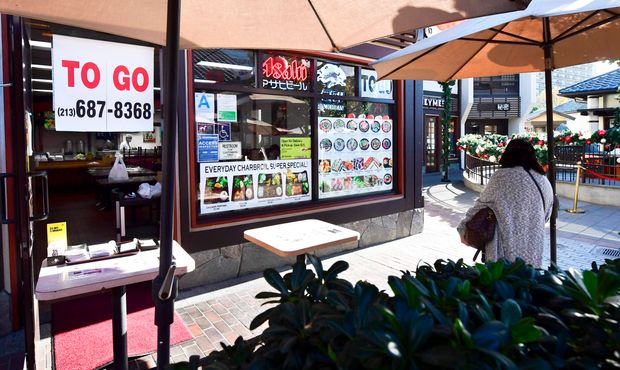
A cook works on a takeout order as a customer waits at restaurant in Los Angeles, California. A record coronavirus wave is forcing businesses and consumers to take fresh precautions.
frederic j. brown/Agence France-Presse/Getty Images
The large service side of the U.S. economy mostly brushed off a record surge in coronavirus cases in November, but business leaders expressed greater worries about what lies ahead.
A survey of senior executives at non-manufacturing companies dipped to 55.9% last month from 56.6% in October, the Institute for Supply Management said Thursday.
Readings above 50% signal that businesses are expanding, but the index has slowed two months in a row and fewer industries are reporting growth.
A similar ISM survey of manufacturers also found slippage in November.
Read: Coronavirus surge slows manufacturers, scares off workers
Also: Absenteeism, shutdowns’ tied to coronavirus hurt businesses again
What happened: Fourteen of the 18 service industries tracked by ISM expanded in November, but that was down from 16 in the prior month.
Among the four sectors that shrank were arts and entertainment. New city and state restrictions on business hours and customer limits have hurt entertainment venues that rely on large crowds to support their business.
Restaurants also suffered again from the same restrictions, especially with colder weather limiting outdoor options in much of the country.
“Most companies are cautious as they navigate operations amid the pandemic and the aftermath of the U.S. presidential election,” said Anthony Nieves, chairman of the survey.
New orders and production both slipped in November. The new orders gauge dipped 1.6 points to 57.2% while the production index edged down to 58% from 61.2%.
A measure of jobs and hiring, arguably the most critical part of the survey right now, actually rose. The employment index climbed to 51.5% from 50.1%
Read: Jobless claims inflated, GAO finds, and many unemployed were underpaid
Although the ISM services index is still relatively high, business is far from normal. The survey asks executives whether conditions are getting better or worse, but it doesn’t reveal how much better.
Executives also expressed more tredipation about the near future because of the record spike in the coronavirus.
“Businesses that reopened are closing for a second time, leading to interruptions in the supply chain,” said one senior executive.
“Conflicting national, regional, and local guidelines/requirements for COVID-19 issues are becoming increasingly difficult to navigate, ” said an executive in the food industry.
Read: Absenteeism, shutdowns’ tied to coronavirus spike hurt U.S. businesses again
Big picture: Some service-oriented companies such as tech firms have been big winners during the pandemic, but most have struggled to get back to business.
The latest viral outbreak will only make it harder on businesses that rely on large groups of customers, such as airlines, hotels, restaurants and entertainment venues.
Read: ADP says private-sector hiring slows to 4-month low
More layoffs and businesses closures, in turn, could stunt the economic recovery and cause momentum to flag before new President Joe Biden takes office in January, especially if Congress fails to pass another federal-relief package.
Market reaction: The Dow Jones Industrial Average DJIA, +0.48% and S&P 500 SPX, +0.30% rose in Thursday trades.











